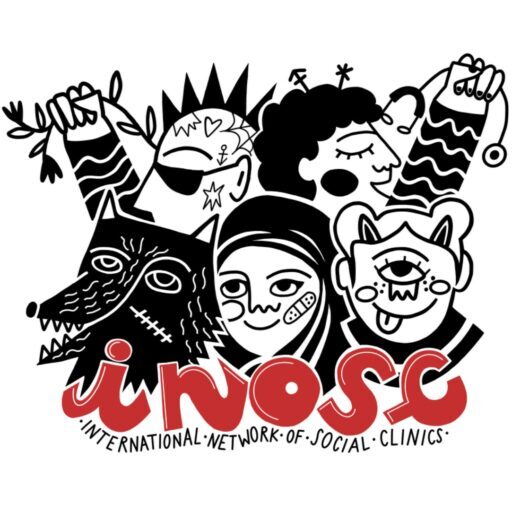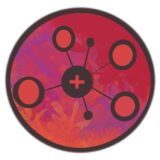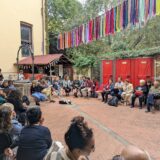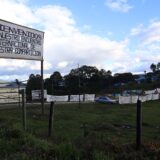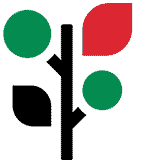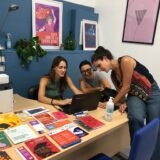section 5: Organisational models, Autogestion and Decision-making processes
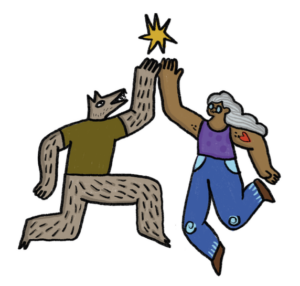 Our organizational models are based on the principles of direct democracy and self-management. These principles demonstrate that people can organize, manage themselves, and make collaborative and egalitarian decisions about their work, their health and their lives.
Our organizational models are based on the principles of direct democracy and self-management. These principles demonstrate that people can organize, manage themselves, and make collaborative and egalitarian decisions about their work, their health and their lives.
We believe that applying horizontal and anti-hierarchical self-organization in healthcare sets a radical political example for envisioning our society. If it can succeed in healthcare, it can be applied anywhere. Autogestion, as we practice it, is a collective and egalitarian organisational practice that employs horizontal decision-making based on consensus. All organizational decisions are reached through collective discussions in assemblies. Each social clinic has various levels of assemblies. While most clinics have a general assembly involving al members, some clinics also have separate working groups that organize their assemblies. Additionally, some social clinics participate in the general assemblies of the spaces they operate in or are affiliated with, such as social centers or national social clinic networks.
In line with a radical and collective vision of healthcare, we believe assembly practices emphasize a commitment against any form of hierarchy. We try to treat all participants equally, regardless of their professional background or qualifications. We also organize different moments of discussion which are open to the incomers who receive support from the social clinic. This is away of facilitating discussion and promoting the importance of our care-focused concept. These moments also serve as a form of self-care for our collective, our activists, and our incomers. They are a means of transforming healthcare by prioritizing care over medicine and addressing the needs of the community. The concept of care permeates all aspects of our organizational practices. Autogestion is a multi-phase process that involves collectively identifying what needs to be decided, formulating a proposal, and determining who makes the decision,who implements it and when. The decision-making process is based on consensus and requires constant re-evaluation of the agreement and, if necessary, the process itself. Our experience taught us that achieving consensus can be challenging, so some social clinics have developed specific strategies to facilitate the process. When disagreements persist, we sometimes postpone the issue to the next assembly, allowing for continued discussion until a collectively agreed proposal emerges. In some clinics, the elaboration of a new proposal may be delegated to a smaller group before presenting it to the entire group for discussion. Overall, self-management means placing trust in the power of collective dialogue.
Social clinics fight for equitable and universal public health systems that ensure everyone’s right to health. We acknowledge that health systems have been dismantled due to public spending cuts and have played a significant role in perpetuating discriminatory and exclusionary practices. We take political action depending on the changes in context, health system models, public policies, power dynamics, social movements, and strategic choices.
laboratorio di salute popolare
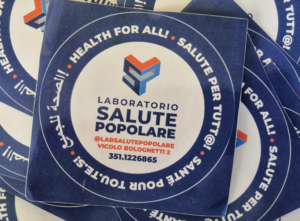 The social clinic “Laboratorio di SalutePopolare” (Bologna, italy) is part of a network of social centers in the city, in which activists can freely participate at any level of organization. Projects may originate from individual assemblies or from the convergence of different areas of work (e.g. from the social clinic and the Italian language school). These projects are discussed collectively, analyzed from multiple perspectives, and shaped into a common political line that then informs al activities of the various social centers. The search for convergence, while respecting the individuality of the single projects, is constant and carried out in weekly meetings.
The social clinic “Laboratorio di SalutePopolare” (Bologna, italy) is part of a network of social centers in the city, in which activists can freely participate at any level of organization. Projects may originate from individual assemblies or from the convergence of different areas of work (e.g. from the social clinic and the Italian language school). These projects are discussed collectively, analyzed from multiple perspectives, and shaped into a common political line that then informs al activities of the various social centers. The search for convergence, while respecting the individuality of the single projects, is constant and carried out in weekly meetings.
There are no structural hierarchies among the activists and the different projects, even if there are different levels of complexity, ranging from the organization of the specific event to the political line being taken in the city’s fabric. since we use this assembly mode, anyone who accesses the clinics (with few exceptions related to psychological support cases) can access any discussion space: professionals and patients are on the same level as political subjects and influence each other in the policy process.
KIA
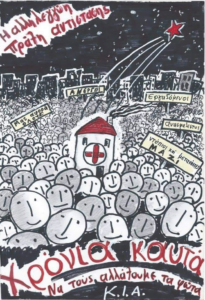 From 2014 onward, Greece saw an unprecedented wave of refugees due to the wars in Syria, Iraq, and Afghanistan. Between 2014 and 2016, an estimated 15 million refugees passed through Greece either from the sea (East Aegean islands) or from land (Greek-Turkish border of Thrace). Thousands of refugees were housed in makeshift camps around Thessaloniki, often in empty industrial buildings overseen by the army, where several NGOs operated. social clinic members formed a reception group in Lesbos, later establishing a clinic and solidarity group in Idomeni.
From 2014 onward, Greece saw an unprecedented wave of refugees due to the wars in Syria, Iraq, and Afghanistan. Between 2014 and 2016, an estimated 15 million refugees passed through Greece either from the sea (East Aegean islands) or from land (Greek-Turkish border of Thrace). Thousands of refugees were housed in makeshift camps around Thessaloniki, often in empty industrial buildings overseen by the army, where several NGOs operated. social clinic members formed a reception group in Lesbos, later establishing a clinic and solidarity group in Idomeni.
We also entered several camps around Thessaloniki (such asSoftex, Fraport, Vasilika, and Diavata) without formal permission, despite entrance being officially prohibited. In these camps, we supported self-organized refugee activities related to accommodation, food, healthcare, and education. We also opened a pathway for visits to the social clinic. In Port camp, we managed to cooperate with a group of refugees to assess their needs, to provide our support to meet these needs and to create a connection with the social clinic (which is just 400 meters from the port) where they could get an appointment with a dentist or other specialist and obtain medicines if needed.
microclinica Fatih
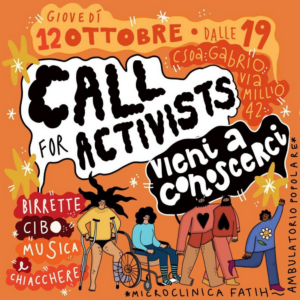 Microclinica Fatih recognizes autogestion as a concrete model of horizontal organization, giving a political meaning to actions that otherwise would be considered useless.
Microclinica Fatih recognizes autogestion as a concrete model of horizontal organization, giving a political meaning to actions that otherwise would be considered useless.
Our clinic is part of CSOA GABRIO, an occupied building since 1994. We strongly believe that autogestion can bypass delegation and empower individuals, making ti easier for people who come to the Microclinica Fatih to join the collective.
This model fosters new relationships between incomers and activists of the clinic, breaking down traditional power dynamics.
